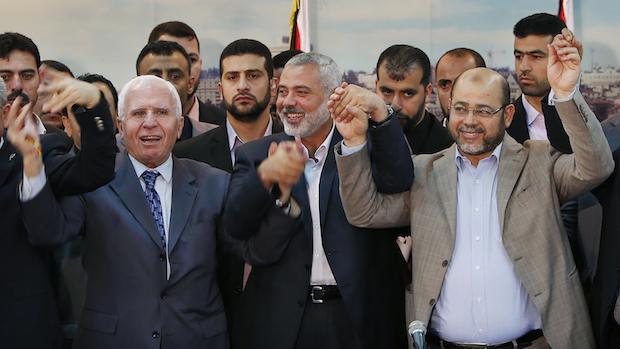Most Palestinians received news of the end of the division between Hamas and Fatah with tepid approval and, in the best of cases, with extremely cautious optimism.
This latest end to the division between Hamas and Fatah comes following years of discussions under the auspices of several Arab states and announcements of “reconciliations” between the two poles that all failed to materialize. Thus the hopes of Palestinians, who had long wanted unified representation, were repeatedly dashed.
The consequences of this division were many: a deepening atmosphere of hostility between Hamas and Fatah, exchanged accusations of treason, and the establishment of new political and economic structures in the West Bank and Gaza.
And so what might be described as societal frugality was born in Gaza. New social strata stagnated, many emigrated, and very few wealthy families could be found in the Strip. Hamas tightened its control over the security services and police and, in turn, took ownership of public lands. The split steadily worsened from 2007, eventually becoming a significant issue requiring much time to overcome. Palestinians came to see that the credibility of any agreement lay in the implementation, and not just in the announcement. After all, they can see that the Hamas platform still clearly differs from that of Fatah, and that serious developments have taken place within societal and political administrative structures in Gaza and the West Bank.
It is true that both Arab and regional forces are imposing themselves on Fatah and Hamas, and a political settlement that brings together the two competing parties is still far beyond the horizon. What is new about this latest announcement, however, is that the path towards bringing the two together has been initiated, and the name of this path is “national reconciliation.”
The realization of this reconciliation lies in adhering to the settlement announced recently and striving to implement its content, starting with the formation of a technocratic government and ending with legislative, presidential and Palestinian National Council elections, as well as rebuilding the Palestine Liberation Organization (PLO) on new foundations. This path to ending the schism and overcoming disputes will lead to the formation of a national consensus government headed by President Mahmoud Abbas, along with technocrats and other figures approved by Hamas and Fatah.
This coalition government, according to the agreement, will be able to take political and administrative measures that are based on the platform of the PLO and in accordance with its directives, as it deems appropriate. Essentially, it will be considered the Palestinian political entity. Meanwhile, there will be discussions to address the many issues standing between them, culminating in the elections.
There are no logistical problems surrounding these elections or their timing, although both political consensus and certain guarantees will have to exist to guarantee the results. Ending the state of internal division cannot be achieved except on the basis of those elections. The path will be a difficult and lengthy one, full of obstacles and crises and thus timetables cannot be relied on to set the pace of implementation. The Fatah and Hamas movements will not allow for another failure this time, and they will be able to persist in ending the division thanks to the interaction between regional and international standpoints, as well as the eventual result from these developments.
On a positive note, the tension, media propaganda and incitement began to defuse the moment the end to the internal division was announced. However, a long history of hostility and recrimination exists, and this is an issue that requires honest, serious and intense efforts to overcome these tensions and work to find a common ground suitable for the long and difficult journey ahead. What was announced in Gaza regarding an end to the division will lead to increased friction between Hamas and Fatah, which simultaneously complement and contradict one another. But this time there must be no downward spiral into distrust, accusations of treason, meddling in one another’s affairs or resorting to armed conflict.
The reconciliation effectively torpedoes Israel’s mission to keep Gaza in a state of geographic and political isolation, and thereby prevent the formation of an independent Palestinian state. Israel has long taken advantage of the geopolitics of the split, and had hoped to demolish the idea there could be an independent Palestinian state because of the impossibility of a divided people achieving self-determination.
But we are now faced with a new stage, the path to ending the division. This path will be both long and difficult!
The counterpoint to this article can be read here.
